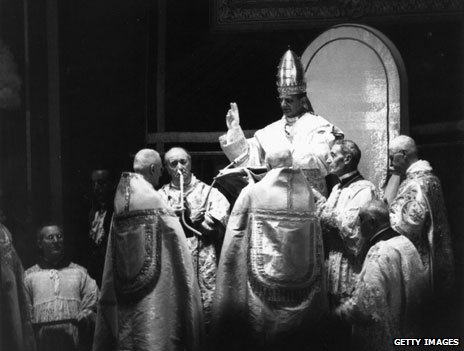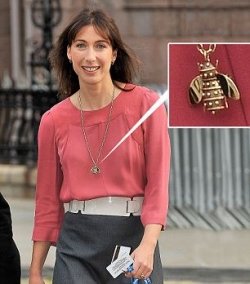It looks like you're using an Ad Blocker.
Please white-list or disable AboveTopSecret.com in your ad-blocking tool.
Thank you.
Some features of ATS will be disabled while you continue to use an ad-blocker.
share:
Nice thread !
SnF for it.
reading the thread something came to mind about the student competition
that is called the spelling bee.
Why would that be named as such?
Could there be some kind of conection?
SnF for it.
reading the thread something came to mind about the student competition
that is called the spelling bee.
Why would that be named as such?
Could there be some kind of conection?
reply to post by RiverRunsFree
I would like to say that this has been one of the best threads I've read lately..............
Very interesting topic and the way you tied everything together is great!!
And it all started from you observing the bee hive symbol on the bank ........pretty darn cool!! LOL.
Thanks so much for your time researching/ posting this and sharing it with us.
Much respect~
snarky
S&F
----------------
ETA: Your thought at the end makes a lot of sense IMO........
"So does the decline in the bee population have anything to do with the decline in our societies? "
It does make one wonder........
I would like to say that this has been one of the best threads I've read lately..............
Very interesting topic and the way you tied everything together is great!!
And it all started from you observing the bee hive symbol on the bank ........pretty darn cool!! LOL.
Thanks so much for your time researching/ posting this and sharing it with us.
Much respect~
snarky
S&F
----------------
ETA: Your thought at the end makes a lot of sense IMO........
"So does the decline in the bee population have anything to do with the decline in our societies? "
It does make one wonder........
edit on 24-2-2013 by snarky412 because: (no reason given)
Don't we all love little bees?

S&F for a real Thread !!
Great work !!
( There was something missing. If i only could remember )

S&F for a real Thread !!
Great work !!
( There was something missing. If i only could remember )
Given 6-sided bee cells you can be assured that there is a 6-6-6 take somewhere.
Bee Movie gives a good indication of 'plans' and the relation of us vs them.
second line.
second line.
Originally posted by aboutface
Congratulations on a terrific presentation. I stopped on the bee and fleur de lys and looked up some things. I found many sites that advance the theory of the iris and most credit kings with using a stylized version of the flower in their coat of arms and symbology.
So now you have me questioning things again re the bee and fleur de lys. No doubt it's in early art and everywhere too. I'll just have to keep on lookingedit on 22-2-2013 by aboutface because: (no reason given)
From your link:
As a dynastic emblem it has also been very widely used: not only by noble families but also, for example, by the Fuggers, a medieval banking family.
Interesting...
Anybody remember the music video by Blind Melon called "No Rain"? The little girl in the bee costume. Back when they used to play music videos on
MTV for over 12 hours a day? Sure they still played shows like Beavis and Butthead, and Singled Out with Jenny McCarthy and Chris Hardwick, but there
was a healthy dose of music. That's right, I'm talking about the 90s baby! I used to hate that video, and that song. Now I kinda like it. Rather
nostalgic. And now I can kind of feel the angst after the singer died of heroin overdose and now that I've had more life experiences.
One thing about the bee and hive symbolysm is it is a reminder of what can be accomplished when you have multiple people working towards a common goal. In our everyday life, people are in competition. Guys who grew up together as a group of best friends will compete over females, people step over eachother to get ahead in life... But some people organize into groups, or hives, and by working together they accomplish so much more than the common people. You can fool people so easily by pretending not to be associated or even friends, when in fact you are helping eachother. For example, a real estate agent who knows she will have a hard time selling a house shows it to someone, and secretly has someone else show up "unexpectedly" during the walkthrough, all excited and wanting to buy it. Maybe they ask "is this the house that was owned by so and so who buried the gold somewhere in the backyard. The agent acts like they know something about it, but pretends they either don't want to, or can't legally talk about it, therefore raising interest in the potential buyer. There are thousands of other ways this is done. And with a larger group committed to "the lie", the possibilities for deception on many levels grows exponentially... But you need a hive of people who are committed. As committed as a worker bee is to the queen. Even with only two people you can become rich if you are creative enough and loyal to eachother...
One thing about the bee and hive symbolysm is it is a reminder of what can be accomplished when you have multiple people working towards a common goal. In our everyday life, people are in competition. Guys who grew up together as a group of best friends will compete over females, people step over eachother to get ahead in life... But some people organize into groups, or hives, and by working together they accomplish so much more than the common people. You can fool people so easily by pretending not to be associated or even friends, when in fact you are helping eachother. For example, a real estate agent who knows she will have a hard time selling a house shows it to someone, and secretly has someone else show up "unexpectedly" during the walkthrough, all excited and wanting to buy it. Maybe they ask "is this the house that was owned by so and so who buried the gold somewhere in the backyard. The agent acts like they know something about it, but pretends they either don't want to, or can't legally talk about it, therefore raising interest in the potential buyer. There are thousands of other ways this is done. And with a larger group committed to "the lie", the possibilities for deception on many levels grows exponentially... But you need a hive of people who are committed. As committed as a worker bee is to the queen. Even with only two people you can become rich if you are creative enough and loyal to eachother...
reply to post by 3n19m470
This one LOL-
I remember Blind Melon, didn't know the singer died, I went to a Guns n Roses gig where they were the supporting act back in the 90's.
Interesting theory on the hive mentality, it works but only if it's through choice and knowing, sometimes people are not aware they are part of the hive, just my opinion of course.
This one LOL-
I remember Blind Melon, didn't know the singer died, I went to a Guns n Roses gig where they were the supporting act back in the 90's.
Interesting theory on the hive mentality, it works but only if it's through choice and knowing, sometimes people are not aware they are part of the hive, just my opinion of course.
edit on 25-2-2013 by RiverRunsFree because: (no reason given)
Originally posted by jibbaj
wasn't the bee also the symbol or Beowolf?
Very interesting -
Henry Sweet, a philologist and early linguist specializing in Germanic languages, proposed that the name Beowulf literally means in Old English "bee-wolf" or "bee-hunter"
en.wikipedia.org...(hero)
Originally posted by mikepopy
reading the thread something came to mind about the student competition
that is called the spelling bee.
Why would that be named as such?
Could there be some kind of conection?
I'm not sure on this one, the only thing I can think is it's a gathering of people to perform a task.
Just a guess though, couldn't find anything on this.
reply to post by 3n19m470
Thanks for this post. I've added real estate agents to my list of liars.
On topic, bee brooches were very popular with women in the 20th century, but I couldn't say why. Both my mother and grandmother had one.
Thanks for this post. I've added real estate agents to my list of liars.
On topic, bee brooches were very popular with women in the 20th century, but I couldn't say why. Both my mother and grandmother had one.
Originally posted by littled16
reply to post by RiverRunsFree
I star and flag you, mainly because the meaning of my name is literally "a bee", therefore I find all things "bee" related of interest.
Enjoy!

A star and a flag to the OP for a well researched thread. I am going to have to bone up on my history.
reply to post by RiverRunsFree
Man if everyone wrote something like this up for seeing something unusual we would all BEE a LOT more intelligent!!
Dude this thread was unreal....Awesome connections......Make sure to always BEE this in depth (pun intended)...
Great job!!
Man if everyone wrote something like this up for seeing something unusual we would all BEE a LOT more intelligent!!
Dude this thread was unreal....Awesome connections......Make sure to always BEE this in depth (pun intended)...
Great job!!
edit on 2/25/2013 by Chrisfishenstein because: (no reason given)
This is how the bee is connected to the worship of Saturn, Binah means understanding in the Kaballah
Binah is ruled by the Planet Saturn or Chronos. This takes us into the Titanic period of civilization which preceded the Jehovan or Olympic age. The sacred flower of Binah is the Lily and its tree is the Cypress, used for both funerals and weddings (ie. both destruction and creation), and its sacred animal is the bee, the Sacred Mason and the drinker of the nectar of the Lily.
I got this from here www.bibliotecapleyades.net...
This gives a good summing up of Saturn and there is so much more once you start looking into this you realise absolutely everything we all do is connected to worshipping a dead sun
theforceiswithinyou.twilightlegend.net...
Binah is ruled by the Planet Saturn or Chronos. This takes us into the Titanic period of civilization which preceded the Jehovan or Olympic age. The sacred flower of Binah is the Lily and its tree is the Cypress, used for both funerals and weddings (ie. both destruction and creation), and its sacred animal is the bee, the Sacred Mason and the drinker of the nectar of the Lily.
I got this from here www.bibliotecapleyades.net...
This gives a good summing up of Saturn and there is so much more once you start looking into this you realise absolutely everything we all do is connected to worshipping a dead sun
theforceiswithinyou.twilightlegend.net...
edit on 26-2-2013 by jinni73 because: (no reason given)
reply to post by RiverRunsFree
Bees are awesome! The way their population is declining is really horrible. Honey is such an amazing natural medicine.
Bees are awesome! The way their population is declining is really horrible. Honey is such an amazing natural medicine.
reply to post by RiverRunsFree
Excellent thread. S&F.
I thought I would just add this little bit:
Holy BEE JESUS!
Excellent thread. S&F.
I thought I would just add this little bit:
The Bee in Religion
We have already touched upon the importance of the Anatolian city of Ephesus and its association with the Bee, including its name – the Bee, and its Bee goddess, Artemis. However, Ephesus was an important city in the development of Christianity as well, for not only did it house one of the seven churches of Asia, as listed in the ‘Book of Revelations’, but Paul spend several years there and the last house of the Virgin Mary is believed to have resided nearby. In fact, many believe the Gospel of John was written there. Yet perhaps the greatest revelation of all is that Artemis and her high priests of Ephesus were called Essenes, meaning King Bees.
The Essenes were a Jewish religious sect founded in the first century BC who flourished for roughly 300 years in the vicinity of the Dead Sea, and their base at Qumran produced one the important historical discoveries of the 20th century; the Dead Sea Scrolls. They were also Beekeepers, and the first association of the Essenes with Bees was in the 2nd century AD by a Greek traveler named Pausanias.
The Essenes, or King Bees as they were known, maintained the role of priestly officials and were the forefathers of Christianity. Even the Catholic Church referred to Jesus Christ as an Aetherial Bee, a name that symbolized the personification of the clear upper air breathed by the great Greek Olympians. In fact, the ‘Book of Luke’ (24, 41-43) confirms that the first food eaten by Christ after his resurrection was honey:
andrewgough.co.uk...
Holy BEE JESUS!
Thanks for the additional information everyone, very interesting stuff
Just thought I would throw this out there, I read it today from the BBC, and it seemed appropriate to add -

www.bbc.co.uk...
I found this image of Pope Paul VI renouncing the crown in 1963 -

conciliaria.com...
An image of the early papal crown from circa 1210 AD worn by Pope Innocent III, looks like a hive but it's just a theory of course.

www.paradoxplace.com...
I also found these images for fun, the leaders wives (wife of US President and wife of UK Prime Minster) -


Just thought I would throw this out there, I read it today from the BBC, and it seemed appropriate to add -
Many of the regal trappings of the papacy were set aside by Pope Paul VI, who began his pontificate in 1963 with a coronation, but never wore the beehive-shaped papal tiara again.

www.bbc.co.uk...
I found this image of Pope Paul VI renouncing the crown in 1963 -

conciliaria.com...
An image of the early papal crown from circa 1210 AD worn by Pope Innocent III, looks like a hive but it's just a theory of course.

www.paradoxplace.com...
I also found these images for fun, the leaders wives (wife of US President and wife of UK Prime Minster) -


For the first time in ten years, our citrus trees are covered in blooms. Problem is there are no bees around to pollinate them. Five to ten years
ago when then did not bloom so well, there were swarms of bees on them.
I looked at other banks to see if there were any others that had the beehive symbol... to my surprise I found beehives just like the one I originally
noticed over the entrance of the bank...except the ones I found are real and sit on the roof of the following insitutes -
- Lloyds of London (Lloyd’s is the world’s specialist insurance market. Unlike many other insurance brands, Lloyd's is not a company; it's a market where our members join together as syndicates to insure risks.)
www.lloyds.com...
- London Stock Exchange
www.independent.co.uk...
- Nomura(Japanese Bank, London)
articles.businessinsider.com...
- Mansion House(The Mansion House is located opposite the Bank of England at Bank Junction. As well as being the home and office of the Lord Mayor of the City of London.)
www.ft.com...
- SEB (London headquaters of the Sweedish Bank)
Could be nothing but it reminds me of George Washington's Masonic apron and how the beehive sits on top of everything... just a thought.
- Lloyds of London (Lloyd’s is the world’s specialist insurance market. Unlike many other insurance brands, Lloyd's is not a company; it's a market where our members join together as syndicates to insure risks.)
There’s a buzz around Canopius as the Lloyd’s Managing Agent has announced that it will partner with this year’s City of London Festival by….installing a bee hive in its offices!
www.lloyds.com...
- London Stock Exchange
The London Stock Exchange is to welcome thousands of new worker drones next month, by introducing bees to its rooftop in the City.
Europe's largest stock exchange, the fourth biggest in the world, has taken delivery of two beehives which will receive their 100,000 residents in a fortnight.
www.independent.co.uk...
- Nomura(Japanese Bank, London)
that's the case at Nomura, which is "installing two beehives on the roof of its European headquarters in London," according to Dealbook, via Dealbreaker.
articles.businessinsider.com...
- Mansion House(The Mansion House is located opposite the Bank of England at Bank Junction. As well as being the home and office of the Lord Mayor of the City of London.)
it takes its inspiration from the beehive on the roof of Mansion House
www.ft.com...
- SEB (London headquaters of the Sweedish Bank)
Could be nothing but it reminds me of George Washington's Masonic apron and how the beehive sits on top of everything... just a thought.
new topics
-
Plane Crash in South Korea
Mainstream News: 9 hours ago
top topics
-
Cutting Boards
Food and Cooking: 12 hours ago, 8 flags -
Plane Crash in South Korea
Mainstream News: 9 hours ago, 7 flags -
Mexico Plans Alert App For Migrants Facing Arrest In US
Mainstream News: 14 hours ago, 6 flags
active topics
-
Kurakhove officially falls. Russia takes control of major logistics hub city in the southeast.
World War Three • 18 • : fringeofthefringe -
Petition Calling for General Election at 564,016 and rising Fast
Political Issues • 187 • : elevatedone -
UK Borders are NOT Secure!
Social Issues and Civil Unrest • 19 • : gortex -
Trump's idea to make Canada the 51st US state: 'Potential is massive'
Mainstream News • 107 • : Solvedit -
Cutting Boards
Food and Cooking • 5 • : GENERAL EYES -
Christmas Car Near Detroit…
Automotive Discussion • 10 • : ManSizedSquirrel -
Danish Prime Minister said to keep 3 days worth of canned goods on hand
World War Three • 11 • : DerBeobachter2 -
Why Such An Uproar Over Non-US Citizens With H1-B Work Visas.
Social Issues and Civil Unrest • 46 • : Daughter2v2 -
Plane Crash in South Korea
Mainstream News • 9 • : 38181 -
Post A Funny (T&C Friendly) Pic Part IV: The LOL awakens!
General Chit Chat • 7967 • : KrustyKrab
